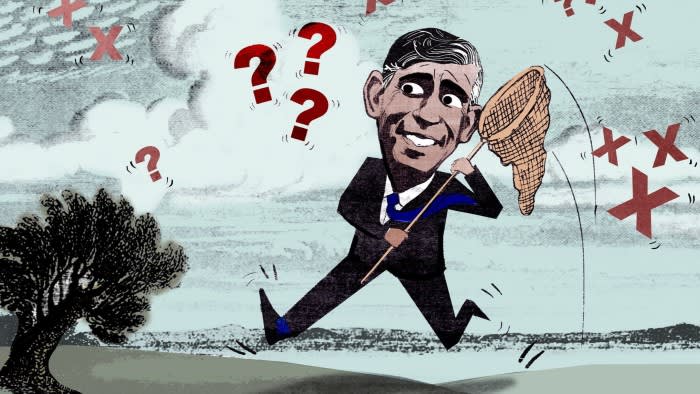Unlock the Editor’s Digest for free
Roula Khalaf, Editor of the FT, selects her favourite stories in this weekly newsletter.
It is a case of the known unknowns. Most of the looming election’s parameters are clear but there is one unquantifiable which troubles party strategists on both sides. The don’t knows.
As Tories grasp at straws in the face of a seeming electoral steamroller, this group has begun to assume a disproportionate importance to those trying to hold the party together and persuade MPs that the game is not entirely up. Isaac Levido, the Conservative campaign chief, has consistently played up the level of undecided voters, stressing that things will only shift in the final weeks when electors are staring down the barrel of a binary choice. There are reasons to believe him. A study of the 2019 election by Lord Ashcroft showed that over a quarter of Labour and Conservative voters did not decide how to vote until the last days of the campaign.
Polls suggest that those claiming to be undecided currently account for around 17 per cent of voters and that, unsurprisingly given the collapse in support, a high percentage of them voted Conservative at the last election. This gives strategists hope that many can be returned to the Tory side of the ledger.
Another attraction of the formerly Tory don’t knows is that they are disproportionately southern. A YouGov analysis found 57 per cent lived in London and the South. Many party insiders have already given up hope of retaining the so-called red wall northern and Midlands seats, prised from Labour in 2017 and 2019. The focus now is on saving endangered southern constituencies.
Yet this hope looks more like mirage than electoral miracle. Voters are deserting the Tories in all directions. The Electoral Calculus site estimates that just over a fifth of lost supporters have gone straight from the Tories to Labour. Many will also simply abstain. Between the 1992 and 1997 elections the Conservatives lost 4.4mn votes but the Labour vote rose by only 2mn.
There is also the large group of former Tories telling pollsters they are going to vote for the Faragist ReformUK party. Recent polls have put Reform as high as the mid-teens though many remain sceptical since this is yet to be tested in national elections. The UK electoral system also works against smaller parties once voters are faced with a binary choice. But unless Reform falls back to low single figures, the election will be disastrous for the Tories.
Given the state of the polls, neither the don’t knows nor the Reformers are enough to save the Conservatives — even in the implausible scenario that they could be fully recaptured. All the data suggests a majority of the country believes time is up for the government. But as one pollster puts it, eating into those groups “can turn an apocalyptic outcome into a regular defeat”. The difference between a Conservative party with well under 200 seats and one above that figure is enormous both in terms of their future prospects and the size of a Labour majority.
Unfortunately for the Tories, while the don’t knows and Reform supporters share some demographic similarities (often older and outright homeowners) there are also big differences which complicate the task of appealing to both groups. Survation reported at the end of last year that: “A larger share of currently undecided voters would consider voting Labour (40 per cent) than would consider voting Conservative (37 per cent). There is little evidence to suggest that currently undecided voters are waiting to flock back to the Conservatives.”
This also means they may be less amenable to more radical rightwing policies which some Tories believe are necessary to stem the notional tide towards Reform. Don’t knows might like a practical offer on immigration but they are less likely to be wooed by overly aggressive measures or disputes over whether to leave the European Convention on Human Rights.
There are, however, some steps that could help. The first and simplest is to end the displays of disunity, the constant chatter about leadership challenges, which are likely to flare up again after the local elections in May. Voters will not support a party that cannot govern itself.
Above all the Conservatives need to stick with the original strategy of building up the prime minister and making voters fear the risks of a change. This means focusing almost exclusively on the economy and cost of living. Days spent on anything else are days lost. Yet even allies fear it is too late. One cabinet minister admits that voters want economic change but are now “discounting” even attractive Tory promises. Sunak increasingly is viewed as weak.
The other key Tory approach is to make voters fearful of Labour, looking to scare discrete groups about the cost of Labour policies, be it the tax changes which will increase private school fees, or the open goal the opposition left by saying they would review the Tory expansion in state-funded childcare.
Labour does not see the don’t knows alone as enough to deny it victory but it fears that any early success in winning back a chunk during the campaign could build a narrative of Tory momentum, which creates panic and disrupts the strategy.
But all this betrays the fundamental point. The don’t knows can help but they cannot save Sunak. No election can ever be taken for granted but for many Conservatives this is no longer about trying to win. It is now about losing well and staving off defeat so catastrophic it puts them out of office for a decade or more.
robert.shrimsley@ft.com
